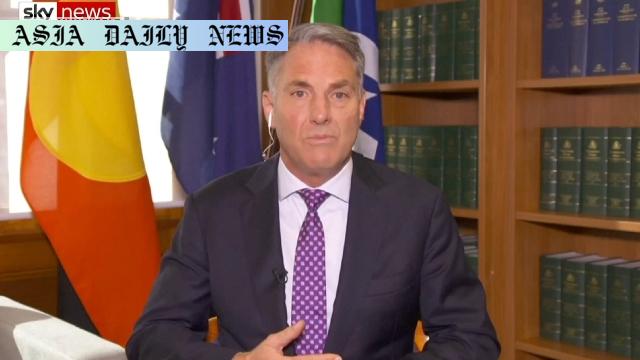AUKUS: Australian Defense Minister expresses confidence despite US review to align with America First agenda.

AUKUS: A Landmark Security Pact
The AUKUS trilateral defense agreement between Australia, the United Kingdom, and the United States marked a significant milestone in strategic security collaboration when announced in 2021. This pact aimed at enabling Australia to acquire state-of-the-art nuclear-powered submarines, amplifying the nation’s defense capabilities drastically. The strategic ambition behind this program is deeply intertwined with countering regional threats, particularly in the Indo-Pacific region, reaffirming a commitment to maintaining stability and deterring aggression.
However, recent headlines suggest a potential challenge to the pact. The administration led by Donald Trump is conducting a review of AUKUS, raising concerns relating to the implications of the “America First” policy that aims to prioritize the United States’ own interests. While some skeptics view this review as a stumbling block, others see it as the due diligence required under new political leadership. Defense Minister Richard Marles has tried to quell fears by expressing confidence in the pact’s continuity, emphasizing its multi-decade nature and the normalcy of governmental reviews during leadership changes.
Challenges and Skepticism in the Review
The review led by senior defense figure Elbridge Colby has drawn attention due to his prior skepticism of the initiative. While the motivations behind such skepticism remain speculative, they align with a broader push to justify the pact’s alignment with the principles of heightened US interests. Furthermore, US Defense Secretary Pete Hegseth called upon Australia to raise its defense budget to 3.5% of GDP. Experts interpret this not only as a fiscal measure to support AUKUS but also as a leveraging mechanism in the ongoing review and negotiations.
These demands provoke important questions about Australia’s economic capacity and political will to meet such requirements. While defense budgets could theoretically be adjusted, it would entail significant reallocation of priorities for the Albanese government. The impending meeting between Prime Minister Anthony Albanese and President Trump, scheduled on the sidelines of the Group of Seven (G7) summit, is expected to shed more light on these negotiations.
Australia’s Confidence and Long-Term Vision
Analyzing Defense Minister Marles’ reassurances provides an intriguing perspective amid the current developments. Instead of viewing the review as a threat, he framed it as an opportunity for new leaders to exercise accountability. His statements on the pact being a “multi-decade program” underscore the expansive and enduring perspective of AUKUS. He validly points out the transient nature of any political administration and how such reviews are customary in transitional governance processes.
This pragmatic approach calms fears, reminding global onlookers that the fundamental essence of AUKUS is robust and designed for long-term deployment to uplift Australia’s defense stature. Review or not, the terms laid through negotiations and the scope of the pact are sufficiently visionary to endure political vicissitudes.
Looking Ahead in AUKUS Developments
The upcoming bilateral discussions between Trump and Albanese at the G7 summit are pivotal. These deliberations can determine whether adjustments are necessary to assuage American concerns while preserving the integrity of the pact. Public sentiment and media opinions will likely diverge across political alignments, and whether Australia raises its defense spending remains another critical issue to follow.
As the review unfolds, its result could potentially strengthen or redirect certain pathways within the AUKUS framework. Regardless, it remains a keystone initiative shaping modern defense cooperation on the global stage. Its practical implications, strategic positioning, and normative values will shape the security dynamics of the Pacific, perhaps setting precedence for future alliances. Observers would do well to follow the sequence of events with a discerning lens toward broader geopolitical shifts.
Commentary
The Larger Significance of AUKUS’ Success
AUKUS stands as a defining moment for modern global defense pacts, embodying the essence of collective security in today’s multi-polar world. Its significance blossoms beyond mere submarines; AUKUS is a strong symbol of allied unity in the face of volatile regional politics, particularly with the rising ambitions of China in the Indo-Pacific region. For Australia, its place as a Western partner imbued with cutting-edge technology and strategic autonomy is an unequivocal upgrade. Likewise, for the US and UK, this pact consolidates influence, validates their commitment to allies, and furthers their shared interests abroad.
Australia’s Role Amidst Policy Shifts
The questions surrounding Australia’s defense spending add another layer of complexity. While defense budgets could address short-term goals, their increase to 3.5% of GDP may come at the expense of other socio-political needs. The demand also points toward an implicit expectation from allies like the US for partners to carry more of the burden. AUKUS signals a transformative journey for Australia—one that is both ambitious and fraught with fiscal challenges. Despite this, the Albanese administration must articulate that security investments are long-term solutions for prosperity and stability in a geopolitically heated region.
Broader Ripple Effects of AUKUS’ Reviews
The Trump administration’s scrutiny highlights another important aspect: no international agreement is immune to nationalistic review processes. However, such reviews, contentious as they may initially appear, can stimulate necessary clarifications or adjustments to endure political storms. AUKUS will ultimately be judged by its results—enhanced security posture for Australia, a counterbalance in the Indo-Pacific theater, and harmonious intraregional cooperation among allies. The essential question remains whether all involved nations can navigate the compromises and exigencies of time while preserving a united front.


